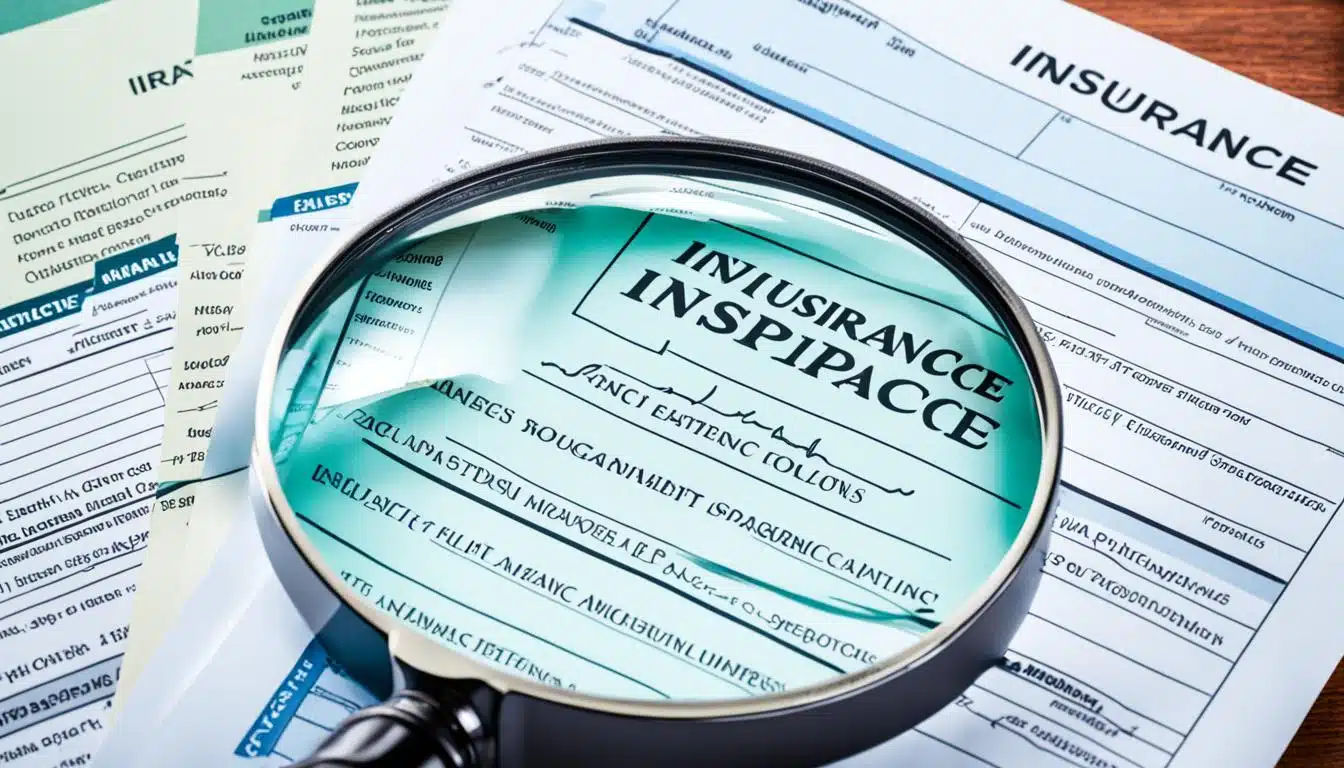Insurance for beginners can be a complex topic, but understanding the basics is crucial for making informed decisions about coverage and protection. Insurance is key for your safety and finances. It helps cover costs from accidents, illnesses, or disasters. This means having a plan for health insurance, life insurance, homeowners insurance, or auto insurance is vital.
An insurance policy is like a contract between you and the insurer. This contract promises to help pay for losses. It works by spreading risk among many people, making costs lower for everyone. You likely have some insurance – for your car, your house, your healthcare, or your life.
Key Takeaways
- Insurance provides financial protection against unexpected events and losses.
- Insurance companies pool their clients’ risks to make payments more affordable.
- Common types of insurance include health, life, homeowners, and auto insurance.
- Understanding key insurance concepts, such as premiums, deductibles, and coverage limits, is crucial for making informed decisions.
- Regularly reviewing and updating your insurance coverage is important to ensure you have the right protection for your needs.
Understanding Insurance: A Beginner’s Guide
Insurance is key in personal and financial plans, offering protection and peace. Knowing insurance basics helps you pick the right coverage. We will cover the importance of insurance, its basics, and the types of policies you can choose from.
What is Insurance?
Insurance is a deal between you (the policyholder) and a company. You pay money and they agree to help with certain risks. Lots of people sharing risks makes insurance affordable for everyone.
Why is Insurance Important?
It shields people and businesses from big, unexpected costs. It covers medical, property, and other expenses. Insurance moves the risk from you to the insurer, protecting against money problems from surprises. This offers peace of mind and security.
Types of Insurance Policies
Various insurance types are out there to suit different needs. You can choose from:
- Health Insurance: It takes care of medical costs, like hospital stays and medicines.
- Life Insurance: Ensures your family gets a lump sum if you pass, for expenses and living costs.
- Homeowners and Renters Insurance: Covers property, belongings, and accidents, disasters, or theft.
- Auto Insurance: Handles car accident costs and offers theft or disaster protection.
- Disability Insurance: Gives a part of your income if you can’t work due to disability.
- Unemployment Insurance: Helps those who lose jobs through no fault for a while.
Choose your insurance carefully, thinking of your needs, budget, and coverage. Knowing your options makes these decisions easier, protecting your health, assets, and future.
Health Insurance Essentials

Health insurance can seem complicated, but it’s important. Knowing the key parts helps you make smart choices. This protects both your health and money. You might look for plans at work, on the Affordable Care Act (ACA) marketplace, through Medicare, or from private companies. Understanding what’s out there is the first step to get the right plan for you.
Insurance For Beginners: Health Insurance Coverage Options
The health insurance world has many different options. These include what your job offers, plans you buy yourself, Medicaid, and Medicare. Knowing who can join, what they cover, and where you can go for care is crucial. It helps to find a plan that meets your needs and fits your budget.
Understanding Premiums and Deductibles
Premiums and deductibles are at the core of any insurance plan. They affect how much you pay and when. Premiums are what you pay regularly to keep your policy. Deductibles are what you pay first, out-of-pocket, before the insurance helps. Figuring out the best mix of costs and coverage is important. Choosing high or low premiums and deductibles comes with trade-offs. It’s all about finding the best balance.
Choosing the Right Health Plan
Selecting a health insurance plan that fits you requires thought about your health, money, and what you like. Think about what health services you may need, who you can go to for care, and if extra benefits like dental and vision are included. It’s also useful to understand different types of plans (like HMO, PPO, HDHP) to see what’s right for you. This helps you pick a plan that supports your health and finances.
By knowing the health insurance essentials, you can make better choices. This means understanding your options and thinking about what you need. Remember, your health and financial safety are important. So, explore all your choices and choose wisely.
| Health Insurance Coverage Options | Key Considerations |
|---|---|
| Employer-sponsored plans | Eligibility, coverage levels, provider network |
| Individual market plans | ACA marketplace, premium subsidies, plan categories |
| Medicaid | Income-based eligibility, covered services, enrollment |
| Medicare | Age-based eligibility, coverage for seniors and disabled, enrollment |
Homeowners and Renters Insurance

Starting to own or rent a home means knowing about homeowners and renters insurance. These plans protect your important things, offering a safety net when things go wrong.
What is Homeowners Insurance?
Homeowners insurance guards your home and what’s inside. It can help with getting a mortgage. This insurance gives peace when dealing with disasters, theft, or if someone gets hurt at your place.
Coverages and Exclusions
Insurance For Beginners: Homeowners’ plans usually cover your house, what’s in it, and protect you if someone gets hurt. But, they might not include damages from floods or earthquakes. Checking your plan closely ensures it meets your family’s specific needs.
Renters insurance, on the other hand, keeps your things safe, even if you’re not the owner. It’s a smart choice, whether you’re required by the law or not, because it offers protection you wouldn’t have otherwise.
Both homeowners and renters insurance are important. They shield your health and money no matter your stage in life. Knowing what your plan covers helps you choose the best for your family’s safety and peace of mind.
| Coverage | Homeowners Insurance | Renters Insurance |
|---|---|---|
| Dwelling | Yes | No |
| Personal Property | Yes | Yes |
| Liability | Yes | Yes |
| Additional Living Expenses | Yes | Yes |
| Deductibles | Typically $500-$2,000 | Typically $250-$1,000 |
| Average Annual Premium | $1,200-$1,800 | $150-$300 |
Auto Insurance Basics

Auto insurance keeps drivers safe by providing financial help after a crash or other accidents. Knowing about auto insurance can guide you in picking the best insurance plan for you. This way, you can make smart choices for your coverage needs.
Liability Coverage
Liability insurance is vital, covering harm or damage you might cause in a crash. It’s often a must by state rules. It safeguards your money from lawsuits, covering medical bills, damages, and legal costs.
Collision and Comprehensive Coverage
Many choose collision and comprehensive coverage on top of liability. Collision coverage handles your repairs from clashing with cars or objects. Comprehensive coverage protects from theft, vandalism, or more. These extras guard your car in various situations.
Knowing what insurance parts do helps you find a plan that fits your budget and needs. No matter if you’re new to driving or have lots of practice, looking at your insurance can bring peace and security when driving.
| Coverage Type | What it Covers | Typical Limits |
|---|---|---|
| Liability | Damage or injuries you cause to others | $25,000/$50,000/$25,000 (bodily injury/per accident/property damage) |
| Collision | Repairs to your vehicle if you collide with another car or object | Varies based on deductible and vehicle value |
| Comprehensive | Covers damage to your vehicle from non-collision incidents, such as theft, vandalism, or natural disasters | Varies based on deductible and vehicle value |
Life Insurance 101
Life insurance is key for a full insurance setup. It offers a safety net for your family if you pass away unexpectedly. It’s important to think about policy types, coverage amounts, and premium rates.
Term life insurance covers you for a set time, like 1 to 30 years. It’s quite affordable, which is why many choose it for basic protection. Whole life insurance and universal life insurance cover you forever and can build cash value.
When figuring out how much coverage you need, think about your family’s future. This includes debts, health insurance, and living costs. Experts often suggest a coverage that’s 10 to 15 times your yearly pay.
The premium cost changes based on your age, health, and policy type. Healthier, younger people usually pay less. Those with health issues might pay more. It’s wise to look at various life insurance offers before choosing.
Understanding life insurance basics is important. It lets you make smart choices for you and your family’s future. Partnering with a good insurance provider is crucial. They can help you through the process and make sure you get the best plan.
Insurance benefits
Insurance can be complicated, but it’s important to know what benefits and services you get. Health insurance, medicare, dental plans, and life insurance all offer valuable protection. These benefits keep you financially secure and give peace of mind.
What Services are Covered?
Insurance For Beginners: Your insurance will cover many important health services. This includes preventive care, doctor visits, and hospital stays. It also covers prescription drugs and emergency services. Many plans even offer dental and vision care, and pet insurance. It’s key to know what your policy covers to get the best care.
Qualifying for Insurance Benefits
To get insurance benefits, you need to meet certain rules. It might depend on your job, how much you earn, or big life events. For instance, if you lose your job, you could get unemployment insurance benefits. Medicaid and Affordable Care Act (ACA) plans consider your income and family size. You must research the rules for your chosen plan. This helps you get the most out of your benefits.
| Insurance Benefit | Coverage | Eligibility Requirements |
|---|---|---|
| Health Insurance |
|
|
| Dental Insurance |
|
|
| Life Insurance |
|
|
Know what comprehensive benefits different insurance providers offer and how to qualify. This knowledge helps you protect your health and finances all through life.
Travel Insurance: Protecting Your Adventures

Going on a vacation or adventure is thrilling, but things can go wrong fast. This is where travel insurance is key. It protects your journey, whether near home or far. It gives you the peace of mind to fully enjoy your experience.
Trip Cancellation and Interruption Coverage
Travel insurance keeps your money safe if your plans change. It covers costs you can’t get back, like flights and hotels, if you have to cancel. This is important if something like illness or a family emergency happens. With it, you avoid losing money due to life’s surprises.
Medical Emergencies and Evacuation
Health problems and accidents are always possible. Medical care abroad can be expensive. Travel insurance can help with these bills. It covers things like doctor’s visits and, if needed, getting you to a better hospital. It’s a big help especially when your usual health insurance isn’t enough. This way, you focus on getting better, not the cost.
The right insurance coverage means you can travel the world worry-free. It prepares you for anything, letting you make amazing memories. With travel insurance, unexpected surprises won’t ruin your trip financially.
Also Read : Covered & Confident: The Essential Steps To Getting the Right Health Insurance
Insurable Interests and Risk Management

Insurance For Beginners: Knowing about insurable interests and good risk management strategies matters a lot in the world of insurance. Insurable interests are what we legally and financially own and have to protect ourselves against loss. Risk management means taking steps to spot, understand, and reduce different risks.
Understanding Insurable Interests
What’s an insurable interest? It’s a real, legal, or financial link between the policyholder and the insurance policy’s main thing. This link must be there when the policy is bought and if there’s a claim or loss. Insurable interests might be about what you own, promises you’ve made, or your financial stake in the thing or person that’s covered.
Take a homeowner, for example. They surely care about their home and its stuff because their money depends on keeping it safe. And a business owner? They’re deeply connected to their business’s things and how it runs. Any harm or pause in the business hits their financial health and profitability hard.
Risk Management Strategies
Good risk management is key for everyone, not just for businesses. It helps cut down on possible losses and keep our important stuff safe. Here are some common risk management strategies:
- Risk identification: First, we need to figure out what risks we face. These could be natural disasters, accidents, or money troubles.
- Risk analysis: Next, we should look at how likely and how bad these risks are. This helps figure out what to deal with first.
- Risk control: Then, let’s do things to make these risks less likely or less severe. This can be through safety rules, getting insurance, or spreading out our investments.
- Risk financing: Finally, we can handle risks by sharing them with others or getting insurance policies. We might also save up money for emergencies or join risk-sharing groups.
Getting what insurable interests and smart risk management strategies are about helps us all. It lets people and businesses keep their things safe, handle any loss of money, and face unexpected events with peace of mind.
Insurance Policies and Contracts
Knowing the parts of your insurance policy is very important. This includes what you pay (premiums), what you cover (deductibles), and the max the policy will pay out (coverage limits). It’s vital to understand these details. They help you choose the right policy and know you’re properly protected.
Policy Components: Premiums, Limits, and Deductibles
The premium is what you give the insurance company for your policy. It changes based on things like your age and where you live. The deductible is what you pay first before the insurance starts to help. Coverage limits are the most the insurance will give for certain claims.
Legal Aspects of Insurance Contracts
Insurance policies are more than just coverages. They’re legal agreements. These agreements explain what you and the insurance company must do. They’re controlled by state rules and they cover use terms, what’s not covered (exclusions), and how to ask for money (claims processes). Knowing the legal parts of your policy is key. It helps if you have any problems and ensures you get the coverage you paid for.
FAQs
Q: What is health insurance and why is it important?
A: Health insurance is a type of coverage that pays for medical and surgical expenses incurred by the insured. It is important because it helps protect you from high and unexpected medical costs, provides access to quality healthcare, and offers preventive care services to keep you healthy products and services.
Q: Who is eligible for health insurance?
A: Eligibility for health insurance can vary depending on factors such as employment status, income, age, and family size. In the United States, individuals may be eligible for health insurance through their employer, government programs like Medicaid or Medicare, or the health insurance marketplace life insurance company.
Q: What are the benefits of enrolling in a marketplace plan?
A: Enrolling in a marketplace plan allows individuals to compare and choose from a variety of health insurance options, access financial assistance in the form of premium tax credits and cost-sharing reductions, and ensure compliance with state laws regarding health insurance coverage medicare supplement insurance.
Q: How do health insurance costs affect individuals and families?
A: Health insurance costs can impact individuals and families by influencing their ability to afford necessary medical care, affecting their financial stability, and determining the level of coverage and benefits they receive from their insurance plan health insurance benefits aetna life insurance company coinsurance and deductibles.
Q: What is preventive care and why is it important in health insurance?
A: Preventive care includes services such as screenings, vaccinations, and annual check-ups that are designed to detect and prevent potential health problems before they become serious. It is important in health insurance because it promotes early detection of health issues, reduces overall healthcare costs, and improves overall health outcomes.
Q: Can individuals receive unemployment benefits if they are on a health insurance plan?
A: Individuals who are on a health insurance plan can still be eligible for unemployment benefits if they meet the specific requirements set by their state’s unemployment insurance program for health benefits.
Q: How does health insurance provide peace of mind to individuals and families?
A: Health insurance provides peace of mind to individuals and families by offering financial protection against unexpected medical expenses, ensuring access to quality healthcare services, and offering support for preventive care and wellness initiatives.





